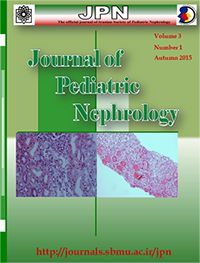Emotional Disorders in Children with Monosymptomatic Primary Nocturnal Enuresis
Journal of Pediatric Nephrology,
Vol. 3 No. 1 (2015),
10 Dey 2015
,
Page 22-25
https://doi.org/10.22037/jpn.v3i1.7402
Abstract
Introduction: All children sometimes misbehave and some may have temporary behavioral problems due to stress. For example, the birth of a sibling, a divorce, or a death in the family may cause a child to act out. Behavior disorders are more serious. They involve a pattern of hostile, aggressive, or disruptive behaviors for more than 6 months. The behavior is also not appropriate for the child's age. Nocturnal enuresis (NE) is one of the most frequent pediatric pathologies. The prevalence of primary nocturnal enuresis (PNE) is around 9% in children aged 5-10 years and about 40% of them have one or more episodes per week.
Materials and Methods: in this study, we recruited 146 children with MPNE and 146 healthy children without MPNE aged 6-18 years old. The children behavioral checklist for children behavioral assessment was completed by the parents. Data was analyzed using ANOVA and chi- square tests.
Results: Among 292 children in both groups, somatic complaints, thought problems, delinquent problems, social problems, and ADHD were not significantly different between cases and controls while internalization, externalization, anxiety-depression, aggressive behaviors, isolation-depression, and affective-behavioral problems were significantly different.
Conclusions: Considering the results of this study, the higher prevalence of behavioral problems in children with MPNE highlights the importance of early intervention for better treatment and prevention of behavioral problem in children.
Keywords: Emotional Disturbances; Nocturnal Enuresis; Child.
How to Cite
References
Yousefichaijan P, Salehi B, Rafiei M, Firouzifar MR, Mousavinejad SA. Parents function and behavioral disorders in children with/ without diurnal voiding dysfunction: A comparative study. ZJRMS 2013;15.
Yousefichaijan P, Soltani P, Haghverdi F, Saeedi N, Salehi B, Sharafkhah M, Taherahmadi H. Parents function and behavioral disorders in children with and without renal transplant recipient’s: A comparative study. Experimental and clinical transplantation 2014;12 supplement 2, 180.
Yousefichaijan P, Salehi B, Firouzifar MR, Sheikholeslami H. The correlation between attention deficit hyperactivity disorder and enuresis in children with nocturnal enuresis.
JIMS, 30, 184 2nd week, 2012, 1-8.
Yousefichaijan P, Firouzifar MR, Cyrus A. Correlation between sacral ratio and primary enuresis. J nephropathology 2012;1(3):183-187.
Yousefichaijan P, Firouzifar MR, Dorreh F. Growth and development in 6 years old children with and without primary nocturnal enuresis. Journal of medical university of zanjan 2011;20(82):97-100.
Van Hoebeke E, Hoebeke P, Braet C, Walle JV. An assessment of internalizing problems in children with enuresis. J Urol 2004;171(2-6):2580-3.
Kodman –Jones C, Hawkins L, Schulman SL. Behavioral characteristics of children with daytime wetting. J Urol 2001;166(6):2392-95.
Von Gontard A, Lettgen B, Olbing H, et al. Behavioral problem in children with urge incontinency and voiding postponement: A comparison of a pediatric and children psychiatric sample. Br J Urol 1998;81 suppl3: 100-6.
Michael W. Mellon, Brooke E. Natchev, Slavica K.Katusic, Robert C. Colligan, Amy L. Weaver, Robert G. Voigt, William J. Barbaresi. Incidence of enuresis and encopresis among children with ADHD in a population-based birth cohort. Acad Pediatr 2013;13(4):10.
Subin Park, Bung-Nyun Kim, Jea-Won Kim, Soon-Beom Hong, Min-Sup Shin, HeeJeongYoo, Soo-Churl Cho. Nocturnal enuresis is associated with ADHD and conduct problems. Psychiatry investing 2013;10(3):253-258.
Joinson C, Heron J, Emond A, Bulter R. Psychological problems in children with bedwetting and combined wetting: A UK population-based study. J Pediatr Psychology 2007;32(5):605-16.
De Bruyne, Van Hoecke E, Van Gompel K, et al. Problem behavior, parental stress and enuresis. J Urol 2009;182(4):2915-20.
- Abstract Viewed: 446 times
- PDF Downloaded: 5096 times

